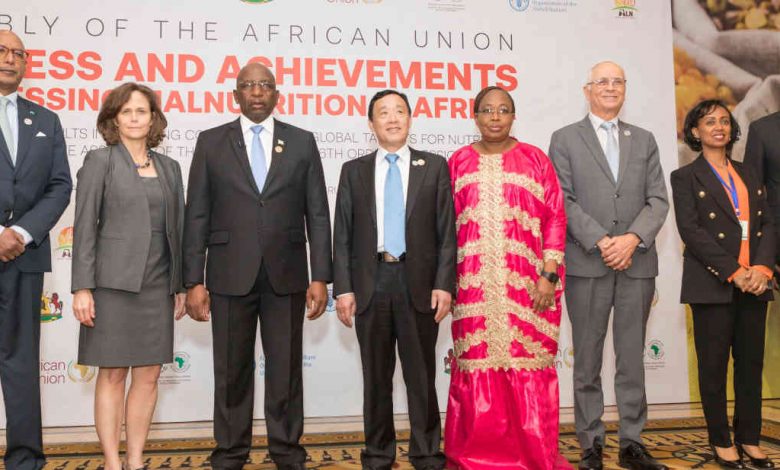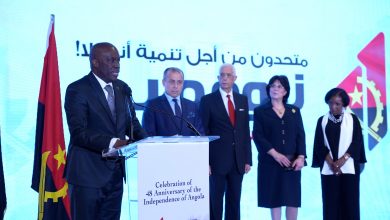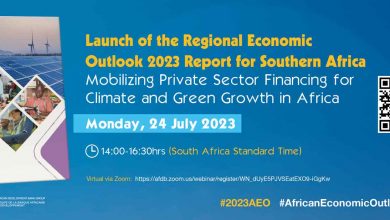African leaders urge continent to strengthen political will to meet continental nutrition goals | African Development Bank

Diplomat.Today
The African Development Bank
2023-02-22 00:00:00
——————————————-
The heads of African Union pledging member states have called for more and accountability in Africa’s efforts to achieve continental and global nutrition goals ahead of the World Health Assembly’s 2025 target nutrition deadline.
The leaders participated in a side event on nutrition during the 36th Ordinary Session of the Assembly of the African Union, co-hosted by the Kingdom of Lesotho, the African Union Commission and the African Development Bank. The meeting was organized in the context of the African Leaders for Nutrition initiative of the Bank and the Food and Agriculture Organization of the United Nations.
The event took place on Friday, February 17, under the presidency of Prime Minister of the Kingdom of Lesotho, Samuel Ntsokoane Matekane. The theme, “Progress and Achievements in Addressing Malnutrition in Africa: Accountability for Outcomes in Achieving Continental and Global Nutrition Goals,” focused on long-term action to curb malnutrition and food security on the continent.
“It is unacceptable that we remain silent and indifferent at a time when 60% of our continent’s population (799 million people) are affected by moderate or severe food insecurity. [Africa] the highest level worldwide. This means that one third of the world’s malnourished people, or 282 million people, live in Africa,” said Matekane on behalf of King Letsie III of the Kingdom of Lesotho.
The king, who is also an African nutrition leader and African Union “nutrition champion”, encouraged those in attendance through a pre-recorded message to support the World Health Assembly’s nutrition goals and Malabo’s goals to reduce malnutrition and stunted growth by the year 2025 , to get.
“I strongly believe that we can meet our nutrition goals. If we can accelerate investments and improve coordination of efforts, Africa will promote nutrition and improve food security outcomes,” he said.
The event served as a wake-up call for African countries to strengthen the political will to meet continental nutrition targets, and their willingness to invest in addressing looming challenges contributing to malnutrition and food insecurity in member states of the African Union have increased.
Looking at the progress made in tackling malnutrition in Africa, Minata Samate Cessouma, Commissioner for Health, Humanitarian Affairs and Social Development at the African Union Commission, presented the progress report based on the Continental Nutrition Accountability Scorecard. The Scorecard is a data-based advocacy tool that provides an overview of how African leaders are delivering key nutritional indicators.
Josefa Sacko, African Union Commissioner for Agriculture, Rural Development, Blue Economy and Environmental Sustainability presented a further analysis of progress on the Malabo Declaration and the African Union’s Comprehensive Africa Agricultural Development Program (CAADP).
Ivory Coast Vice President Tiemoko Meyliet Koné summarized the activities held during the African Union’s Year of Nutrition 2022 and the Abidjan Declaration, which calls for accelerated investment, implementation and coordination to improve nutrition and food security in improving Africa.
“It is now more important than ever to support vulnerable communities with multiple and innovative solutions to build their resilience and transform agri-food systems to deliver better nutrition,” said Dr. Qu Dongyu, Director General of the Food and Agriculture Organization of the United Nations, in his remarks.
Akinwumi A. Adesina, Vice President of the Bank for Agriculture, Human and Social Development, represented African Development Bank Group Chairman Dr. Beth Dunford, told attendees that the bank’s multi-sector action plan offers solutions to Africa’s malnutrition problems. She said the plan is a catalyst for investment in the bank’s food-smart business, leading the bank to reallocate $2.8 billion of its portfolio investment to smart food.
“I believe that nutrition is a central pillar of Africa’s development,” said Dunford, noting that the goal of the plan is to reduce stunting – a consequence of chronic malnutrition – by 40% by 2025. in the redistribution of resources … there is a need to translate this redistribution of funding into hampering reductions on the ground,” she added.
——————————————-



